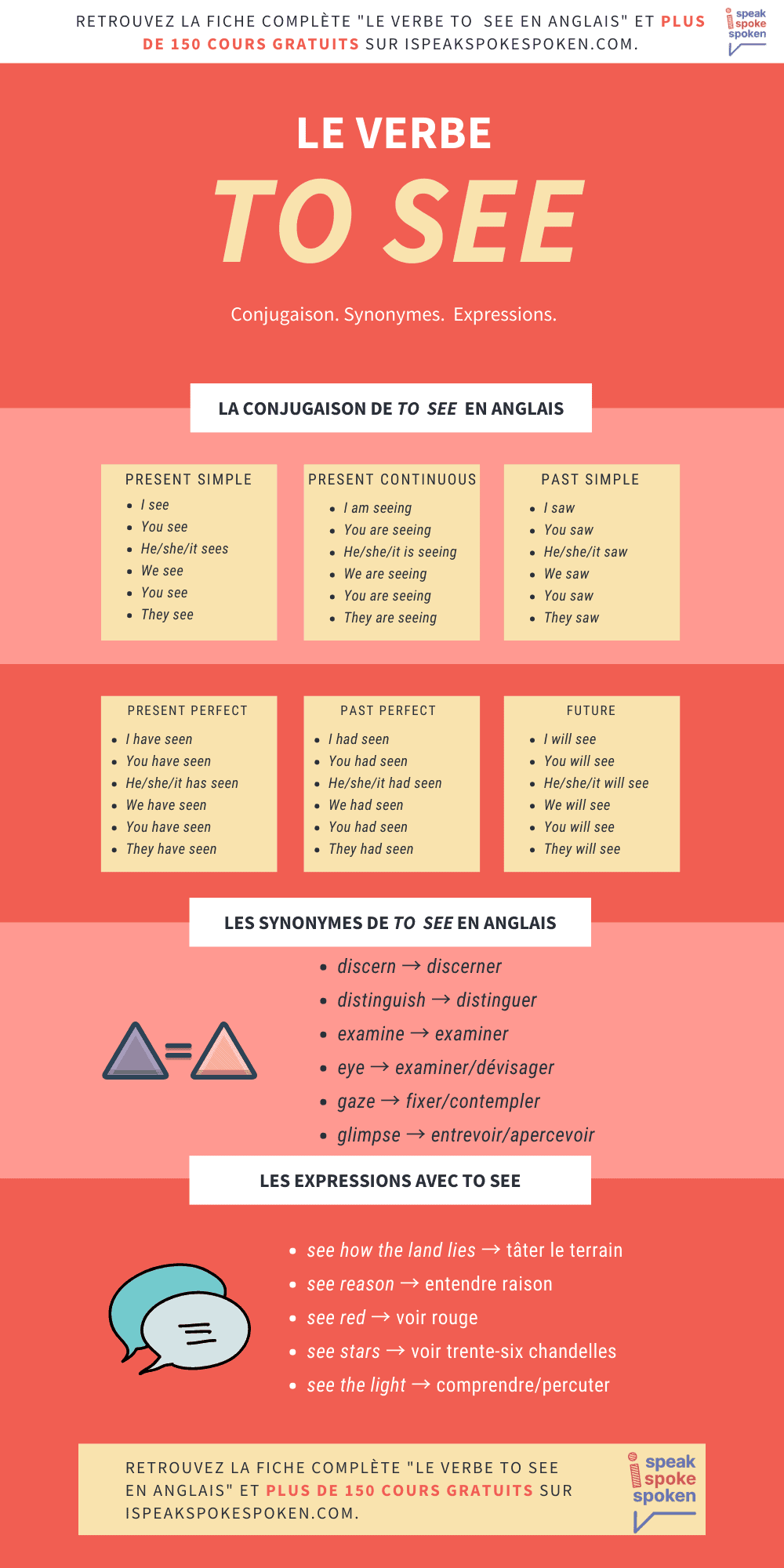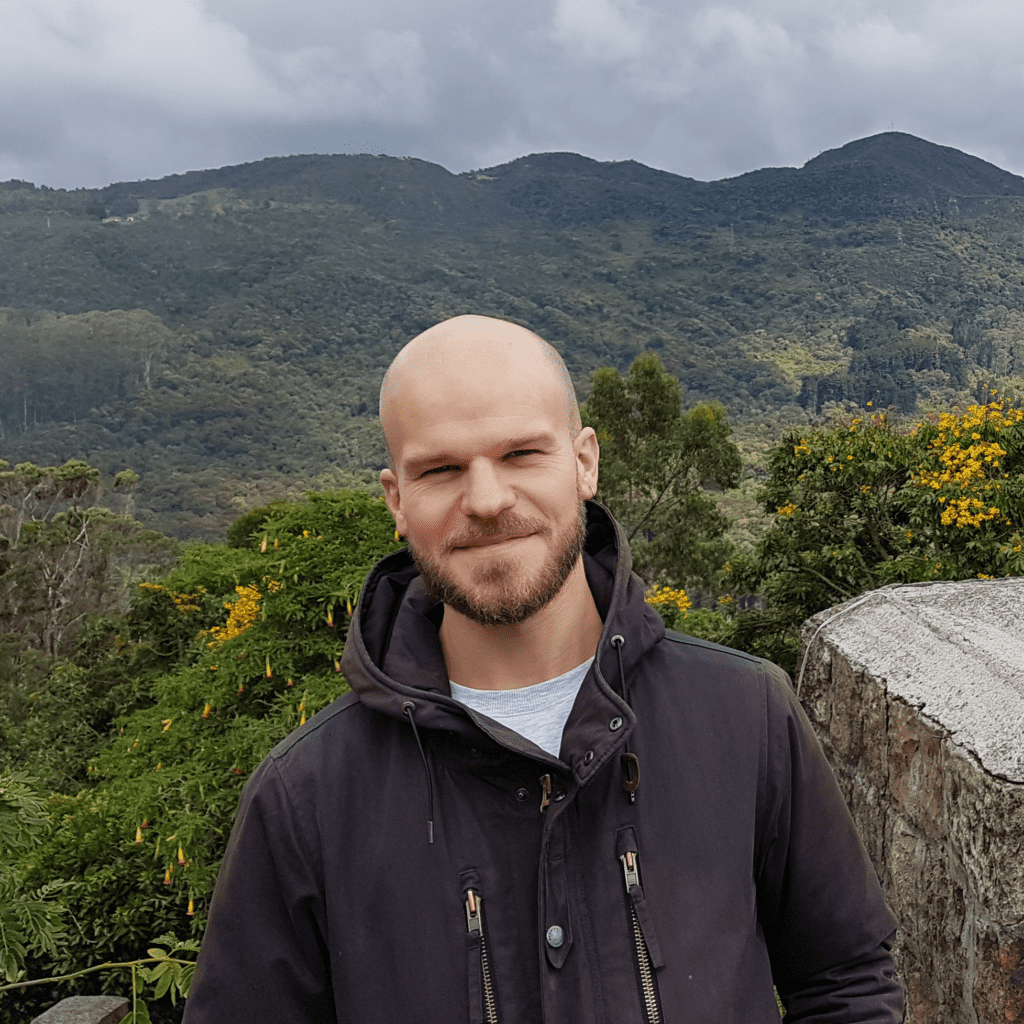Conjugación de see en inglés, diferentes definiciones, phrasal verbs, sinónimos y expresiones: ¡veamos de cerca de este verbo!
Índice →
Tablas de conjugación de see en inglés
Conjugación del verbo see en indicativo
Verbo see en present simple
- I see
- You see
- He/she/it sees
- We see
- You see
- They see
Verbo see en present continuous
- I am seeing
- You are seeing
- He/she/it is seeing
- We are seeing
- You are seeing
- They are ver
Verbo see en past simple
- I saw
- You saw
- He/she/it saw
- We saw
- You saw
- They saw
Verbo see en past continuous
- I was seeing
- You were seeing
- He/she/it was seeing
- We were seeing
- You were seeing
- They were seeing
Verbo see en present perfect
- I have seen
- You have seen
- He/she/it has seen
- We have seen
- You have seen
- They have seen
Verbo see en present perfect continuous
- I have been seeing
- You have been seeing
- He/she/it has been seeing
- We have been seeing
- You have been seeing
- They have been seeing
Verbo see en past perfect
- I had seen
- You had seen
- He/she/it had seen
- We had seen
- You had seen
- They had seen
Verbo see en past perfect continuous
- I had been seeing
- You had been seeing
- He/she/it had been seeing
- We had been seeing
- You had been seeing
- They had been seeing
Verbo see en future
- I will see
- You will see
- He/she/it will see
- We will see
- You will see
- They will see
Verbo see en future continuous
- I will be seeing
- You will be seeing
- He/she/it will be seeing
- We will be seeing
- You will be seeing
- They will be seeing
Verbo see en future perfect
- I will have seen
- You will have seen
- He/she/it will have seen
- We will have seen
- You will have seen
- They will have seen
Verbo see en future perfect continuous
- I will have been seeing
- You will have been seeing
- He/she/it will have been seeing
- We will have been seeing
- You will have been seeing
- They will have been seeing
Conjugación del verbo see en condicional
Verbo see en conditional present
- I would see
- You would see
- He/she/it would see
- We would see
- You would see
- They would see
Verbo see en conditional present continuous
- I would be seeing
- You would be seeing
- He/she/it would be seeing
- We would be seeing
- You would be seeing
- They would be seeing
Verbo see en conditional perfect
- I would have seen
- You would have seen
- He/she/it would have seen
- We would have seen
- You would have seen
- They would have seen
Verbo see en conditional perfect continuous
- I would have been seeing
- You would have been seeing
- He/she/it would have been seeing
- We would have been seeing
- You would have been seeing
- They would have been seeing
Otras formas
El infinitivo de see
- to see
Participio presente de see
- seeing
Participio pasado de see
- seen
El imperativo de see
- see
- let’s see
Nota: to see es un verbo irregular. Consulta todos los verbos irregulares.
Definición de see en inglés
¿Qué significa el verbo see en inglés?
El Cambridge Dictionary ofrece varias definiciones del verbo see.
Veamos las principales:
1. To be conscious of what is around you by using your eyes
It’s too dark. I can’t see anything!
→ Está demasiado oscuro. ¡No veo nada!
2. To watch a film, television programme, etc.
We’ll be there in time to see the movie.
→ Llegaremos a tiempo para ver la película.
3. To be the time or place when something happens
This winter has seen plenty of snowfall.
→ Ha nevado mucho este invierno.
4. To understand, know, or realize
I clearly can’t see what the problem is.
→ Realmente no entiendo cuál es el problema.
5. To meet or visit someone, or to visit a place
I can’t wait to see you on Wednesday!
→ Estoy deseando verte el miércoles.
6. To have a romantic relationship with someone
We have been seeing each other for a long time.
→ Llevamos juntos mucho tiempo.
7. To consider or think about, especially to think about someone or something in a particular way, or to imagine someone doing a particular activity
He didn’t see himself as a father.
→ No podía imaginarse siendo padre.
8. To take someone somewhere by going there with them
Would you mind seeing me to the door?
→ ¿Podrías acompañarme a la puerta?
9. To try to discover
Will you see if she’s awake?
→ ¿Puedes ver si está despierta?
10. To make certain that something happens
I will see that he gets those copies.
→ Me aseguraré de que reciba esas copias.
Para consultar la página completa del Cambridge Dictionary, haz clic aquí.
Phrasal verbs con see en inglés
Recordatorio: los phrasal verbs (o “verbos con partícula”) son verbos que, al ir seguidos de otra palabra (la partícula), completan o modifican su significado original.
Estos son los principales phrasal verbs formados a partir del verbo see:
- see about something → atender un asunto (coloquial)
- see after somebody/something (inglés americano) → ocuparse de
- see in something → celebrar (Año Nuevo, por ejemplo)
- see into something → leer en (el futuro)
- see over something (inglés británico) → visitar, hacer un tour de algo
- see past something → ver más allá de algo (coloquial)
- see past something → no dejarse engañar por
- see somebody in → dar la bienvenida a alguien
- see somebody off → perseguir/alejar a alguien (coloquial)
- see somebody off → despedirse de alguien
- see somebody out → despedirse de alguien
- see somebody out → acompañar a alguien (a la puerta)
- see somebody through → ayudar a alguien (coloquial)
- see something through → conseguir algo (coloquial)
- see to something → cuidar (coloquial)
Sinónimos de see en inglés
Según el contexto, puede sustituir el verbo to see por uno de los siguientes verbos:
- behold → mirar, contemplar
- contemplate → contemplar
- detect → detectar
- discern → discernir
- distinguish → distinguir
- examine → examinar
- eye → examinar/observar
- gawk → mirar embobado
- gaze → contemplar/mirar fijamente
- glimpse → vislumbrar
- look→ mirar
- observe → observar
- peek → echar un vistazo
- peep → echar un vistazo
- perceive → percibir
- regard → mirar/observar
- scan → ojear
- scope → recorrer con la vista
- scrutinize → inspeccionar/examinar
- spot → rdetectar
- stare → mirar (fijamente)
- view → considerar/ver
- visualize → visualizar
- watch→ mirar
- witness → presenciar/ser testigo
Expresiones con see en inglés
- as I see it → en mi opinión
- cannot see the wood for the trees → los árboles no dejan ver el bosque/falta de perspectiva
- have a look-see → echar un vistazo (coloquial)
- long time no see (interjección coloquial) → ha pasado mucho tiempo (desde que nos vimos)
- must-see (adjetivo) → visita obligada
- not see somebody for dust (inglés británico) → marcharse sin pensárselo dos veces
- see above → véase más arriba (en un documento)
- see below → véase más abajo (en un documento)
- see daylight → ver el final del túnel (coloquial)
- see eye to eye → estar de acuerdo
- see fit (to do something) → considerar oportuno (hacer algo)
- see how the land lies → tantear el terreno
- see reason → ver razón
- see red → ver rojo
- see stars → ver (las) estrellas
- see the light → ver la luz/abrir los ojos
- see you later, alligator (interjección coloquial) → hasta luego, cocodrilo/chao, pescao
Al igual que to say, to lose, to put, to drink y to bear, to see también es un verbo irregular. Por eso hay que prestar especial atención a las terminaciones en pasado.



